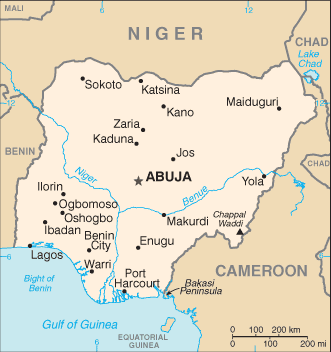 |
usa | world | animals | vocabulary | health | science | math | history |
Nigeria
Map Courtesy CIA World Factbook
The Kanem-Bornu Empire near Lake Chad dominated northern Nigeria for over 600 years, prospering as a terminal of north-south trade between North African Berbers and forest people. In the early 19th century, Usman dan Fodio brought most areas in the north under the loose control of an Islamic empire centered in Sokoto. The kingdoms of Oyo in the southwest and Benin in the southeast both developed elaborate systems of political organization in the 15th, 16th and 17th centuries. Ife and Benin are noted for their prized artistic works in ivory, wood, bronze, and brass. In the 17th through 19th centuries, European traders established coastal ports for the increasing traffic in slaves destined for the American continent. Commodity trade replaced slave trade in the 19th century. The Royal Niger Company was chartered by the British government in 1886. Nigeria became a British protectorate in 1901, and a colony in 1914. In response to the growth of Nigerian nationalism following World War II, the British moved the colony towards self-government on a federal basis. Nigeria was granted full independence in 1960, as a federation of three regions, each retaining a substantial measure of self-government. In 1966, two successive coups by different groups of army officers brought the country under military rule. The leaders of the second coup tried to increase the power of the federal government, and replaced the regional governments with 12 state governments. The Igbos, the dominant ethnic group in the eastern region, declared independence as the Republic of Biafra in 1967 following a pogrom in the northern states that led to the extermination of 30,000 Igbos. Following the creation of Biafra, war broke out with the Federal Government. Under Brigadiers Adekunle, Obasanjo and Murtala Mohammed a systematic and amphibous battle plan that comprised saturated air bombings and starvation forced the Biafran rebels to capitulate. On the 15 of January, left with the choice of surrender and the total destruction of the Biafran populace, Philip Effiong, Chief of Staff of the rebel army accepted the terms of surrender before Yakubu Gowon, Head of the Northern dominated federal government. In 1975, a bloodless coup swept Gowon aside and brought Murtala Ramat Mohammed to power, who promised a return to civilian rule. However, he was killed in an abortive coup, and succeeded by his chief of staff, Olusegun Obasanjo. A new constitution was drafted in 1977, and elections were held in 1979, which were won by Shehu Shagari. Nigeria returned to military government in 1983, by a coup which established the Supreme Military Council as the country's new ruling body. Chief M.K.O. Abiola won the June 12, 1993 Presidential Election, which was canceled by the military government of General Ibrahim Babangida. An Interim National Government was set up, headed by Chief Ernest Shonekan. The Government was declared illegal and unconstitutional by a High Court, and General Sani Abacha took power. He imprisoned Chief M.K.O. Abiola and looted the National Treasury. Many people were assassinated and numerous others cannot be accounted for under the reign of Babangida and Abacha; among the noted is Ken Saro-Wiwa. Ken Saro-Wiwa was an internationally well-known and respected journalist whose assassination shocked many both in and outside the world of journalism. His family later went to trial and brought charges against the Nigerian government through the New York City court system. Abacha's reign of terror came to an end when he died suddenly and in 1998 Abdulsalami Abubakar became leader of the Provisional Ruling Council. He lifted the suspension of the 1979 constitution, and was set to release Chief M.K.O. Abiola the winner of the 1993 Election before the latter died in July 1998 from what international medical experts initially described as natural causes; later this was changed to death from poisonous substance. Court cases since Abiola's death have brought to light that his tea was poisoned. In 1999, Nigeria elected Olusegun Obasanjo as President in its first elections in 16 years. Obasanjo and his party also won the turbulent elections of 2003. Although having won the election, Obasanjo has had a love-hate relationship with the Nigerian people. With the killing of Justice Bola Ige, an advocate for peace, justice and openness, many doubt the success of Nigeria's democratic dream; particularly, with the ever daunting 2007 election around the corner. Many people fear the return of Babangida for he is known as the Idi Amin of Nigeria for a reason.
|
|||||||
 The Federal Republic of Nigeria is a country in West Africa. It is the most populous country in Africa. It borders on Benin in the west, Chad and Cameroon in the east, Niger in the north and the Gulf of Guinea in the south. Major cities include the capital Abuja, the former capital Lagos, Abeokuta, Ibadan, Osogbo, Ilesa, Port Harcourt, Enugu, Kano, Kaduna, Jos, and Benin City. The country's name is unrelated to its African heritage; it was proposed by a Times article in 1897.
The Federal Republic of Nigeria is a country in West Africa. It is the most populous country in Africa. It borders on Benin in the west, Chad and Cameroon in the east, Niger in the north and the Gulf of Guinea in the south. Major cities include the capital Abuja, the former capital Lagos, Abeokuta, Ibadan, Osogbo, Ilesa, Port Harcourt, Enugu, Kano, Kaduna, Jos, and Benin City. The country's name is unrelated to its African heritage; it was proposed by a Times article in 1897.